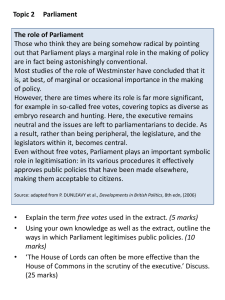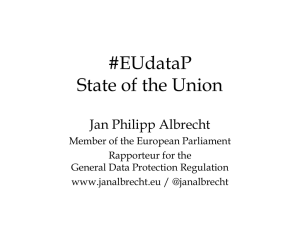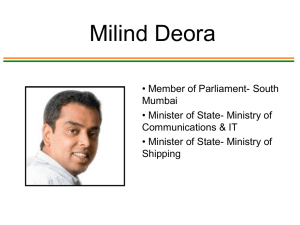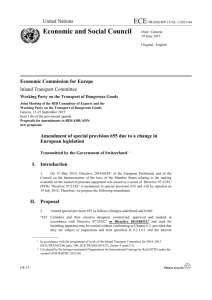contents 1
advertisement
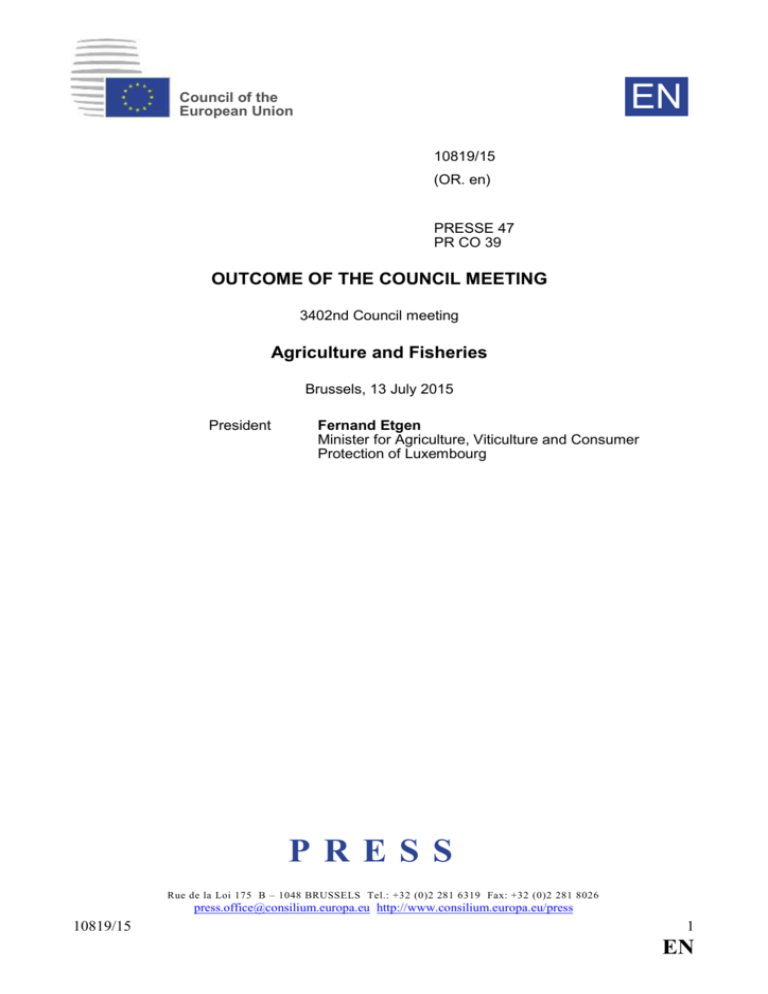
EN Council of the European Union 10819/15 (OR. en) PRESSE 47 PR CO 39 OUTCOME OF THE COUNCIL MEETING 3402nd Council meeting Agriculture and Fisheries Brussels, 13 July 2015 President Fernand Etgen Minister for Agriculture, Viticulture and Consumer Protection of Luxembourg PRESS Rue de la Loi 175 B – 1048 BRUSSELS Tel.: +32 (0)2 281 6319 Fax: +32 (0)2 281 8026 press.office@consilium.europa.eu http://www.consilium.europa.eu/press 10819/15 1 EN 13 July 2015 CONTENTS1 ITEMS DEBATED PRESIDENCY WORK PROGRAMME ............................................................................................. 4 AGRICULTURE ................................................................................................................................. 5 Restriction of use of genetically modified food and feed .................................................................... 5 Market developments ........................................................................................................................... 6 School fruit, vegetables and milk schemes .......................................................................................... 7 ANY OTHER BUSINESS ................................................................................................................... 8 – Research on soils ..................................................................................................................................................... 8 – Plant patenting ......................................................................................................................................................... 8 – Crop protection ........................................................................................................................................................ 9 – Forestry.................................................................................................................................................................... 9 – Blue week ................................................................................................................................................................ 9 OTHER ITEMS APPROVED FISHERIES – General fisheries Commission for the Mediterranean - Adoption of the Council position ................................... 10 FOREIGN AFFAIRS – Restrictive measures - Belarus .............................................................................................................................. 10 ENLARGEMENT – Relations with the former Yugoslav Republic of Macedonia ................................................................................ 11 1 Where declarations, conclusions or resolutions have been formally adopted by the Council, this is indicated in the heading for the item concerned and the text is placed between quotation marks. Documents for which references are given in the text are available on the Council's Internet site (http://www.consilium.europa.eu). Acts adopted with statements for the Council minutes which may be released to the public are indicated by an asterisk; these statements are available on the Council's Internet site or may be obtained from the Press Office. 10819/15 2 EN 13 July 2015 COMMON SECURITY AND DEFENCE POLICY – EUCAP Sahel Niger .............................................................................................................................................. 11 ECONOMIC AND FINANCIAL AFFAIRS – Deficit data in Valencia ......................................................................................................................................... 11 EUROPEAN ECONOMIC AREA – Alignment of technical standards to EU legislation .............................................................................................. 11 TRADE POLICY – Agreement with Andorra - Change in the rules of origin ...................................................................................... 12 INTERNAL MARKET – Information society services and standardisation - Codified rules ........................................................................ 12 INTELLECTUAL PROPERTY – Trade marks reform ............................................................................................................................................... 12 COMPETITION – State aid: enabling and procedural regulations - codified versions ....................................................................... 13 ENVIRONMENT – Preparing the transition to advanced biofuels* ...................................................................................................... 13 – Doha amendment to the Kyoto Protocol ............................................................................................................... 14 ENERGY – Ecodesign requirements for lamps ........................................................................................................................ 14 EMPLOYMENT – Mobilisation of the European Globalisation Adjustment Fund for Finland .......................................................... 15 FOOD LAW – Authorisation of certain colours in dried potato granules and flakes .................................................................... 15 TRANSPARENCY – Access to documents ............................................................................................................................................. 16 DECISIONS ADOPTED BY WRITTEN PROCEDURE – Transparency - Access to documents .................................................................................................................... 16 10819/15 3 EN 13 July 2015 ITEMS DEBATED PRESIDENCY WORK PROGRAMME The Luxembourg Presidency gave a public presentation of its programme for work in the agriculture and fisheries sectors for the next six months. The Presidency considers that sustainability must be the fundamental principle for the future development of European agriculture. This principle must be applied with due consideration of the economic and social dimension, as well as related health and environmental factors (10690/15). Given that perspective, the agricultural policy priorities of the Presidency will include: Focusing on effective simplification of the reformed Common Agricultural Policy (CAP) and ensuring that the Council is fully involved in the process. Beginning negotiations with the European Parliament on organic farming in order to build a regulatory framework adapted to new challenges. Working on market developments, including the Russian agricultural import ban and the expiry of milk quotas and paying particular attention to the effects on farmers. Resuming the examination of the proposals on school fruit, vegetables and milk schemes after the evaluation performed by the Commission; The priorities for fisheries policy will focus on: Organising an in-depth discussion on scientific data relating to the state of fish stocks to allow reasoned, transparent decisions to be taken on this issue. Seeking to reach an agreement on the issue of deep-sea fishing, guaranteeing the sustainable exploitation of these fish stocks. Taking forward the negotiations on the multiannual management plan for the Baltic Sea to ensure the sustainable management of fisheries in this region. Continuing the alignment of several existing regulations with the Lisbon Treaty, with particular attention to illegal and unregulated fishing and the regeneration of European eel stocks; As regards food and veterinary issues, the Presidency intends to: Begin work on the revision of the authorisation procedure for genetically modified organisms in foodstuffs and animal feed. Work towards reaching an agreement at first reading with the Parliament on the legislative proposal on protective measures against pests of plants (plant health). Finalise a more integrated and horizontal approach to official controls to reach a compromise between member states with a view to launching negotiations with the Parliament on this issue. Seek to reach an agreement with the European Parliament on the legislative proposal on the zootechnical and genealogical conditions for trade in and imports from third countries of breeding animals and their germinal products and on the finalisation of the medicated feed dossier. Continue work on medicinal products for veterinary use with a particular focus on combating antimicrobial resistance. 10819/15 4 EN 13 July 2015 AGRICULTURE Restriction of use of genetically modified food and feed The Commission presented to the ministers: a communication reviewing the decision-making process on genetically modified organisms (GMOs) (8344/15); a proposal for a regulation as regards the possibility for the member states to restrict or prohibit the use of genetically modified (GM) food and feed on their territory (8356/15). Ministers then had an exchange of views on the issue on the basis of a Presidency questionnaire (10569/15). Most of them questioned the proposed opt-out option and considered that it would not offer them a practicable and legally sound solution. For example, they pointed out that the word 'use' of a GM as indicated in the proposal is not sufficiently defined and could lead to different interpretations. Many delegations highlighted that the new process could weaken the single market and pointed out that it could contravene the international commitments of the EU. A number of ministers regretted that an impact assessment has not been prepared to evaluate the consequences of the proposal. The Presidency mandated the Council preparatory bodies to examine the technical aspects of the proposal on the basis of further analyses provided by the Commission. Background The communication outlines the need to adapt the GMO legal framework to make better provision for national governments to express their views on the use of GMOs. It notes also that in March 2015, the Council and the Parliament agreed on an amendment of the GMO legal framework to allow member states to restrict or prohibit on their territory the cultivation of authorised GMOs (directive 2015/412/EU). The communication concludes that there is a need to extend this approach to genetically modified food and feed. 10819/15 5 EN 13 July 2015 In that context, the proposed regulation aims to achieve a balance between maintaining an EU authorisation system and the freedom for member states to decide on the use of GMOs on their territory. The current single risk management system with the authorisation system would not be amended, as it ensures that the same level of protection applies throughout the EU. However, the change proposed would mean that since a GMO is authorised for use as food or feed in the EU, member states would be able to decide on whether to opt out from allowing that particular GMO to be used in their food chain. Opt-out measures should be based on legitimate reasons other than those assessed at EU level (i.e. risk to human or animal health or the environment) and should comply with EU law, which includes the principles of the internal market, and with the EU's international obligations. Market developments The Council was briefed by the Commission on market developments and in particular the impact on the EU market of the import ban on EU agricultural products imposed by Russia in August 2014 and recently extended (10613/15). In addition, the Bulgarian, Czech, Hungarian, Polish, Romanian, Slovenian and Slovak delegations presented the worrying situation on the dairy market (10707/15) and the Austrian delegation briefed the ministers on the difficulties faced by the EU pigmeat sector (10711/15). During the exchange of views between ministers, which followed, many member states expressed concern at the consequences for those sectors most affected by the ban including the fruit and vegetables sector. Some delegations noted that the Russian ban is not the only cause of the difficult economic situation faced by the EU milk and the pigmeat sector where there is a significant pressure on prices. A number of ministers called for more to be done for the sectors concerned, by extending the scope of certain measures and diversifying the tools used. A number of delegations joined the Italian delegation in pointing out that the future of the sugar sector should also be the focus of the EU's attention (10710/15). They wanted a soft landing when the quota system comes to an end, which is scheduled for 2017. The Commission announced market measures for fruit and vegetables and milk to mitigate pressure on prices and the effects of the Russian ban. Concerning pigmeat, the Commission recalled that temporary private storage measures were implemented in March and indicated its readiness to evaluate the market situation. 10819/15 6 EN 13 July 2015 Background The Russian ban applies to fruit and vegetables, milk and dairy products and bovine, porcine and poultry meat. In 2014, in response to the ban, the Commission triggered emergency market support measures for fruit, vegetables and dairy products, while also providing funds for Common Agricultural Policy (CAP) promotion programmes to explore new market opportunities. Parts of those measures have been extended in 2015. Following the decision of EU ministers for foreign affairs to extend the current sanctions against Russia for 6 months (until 31 January 2016), the Russian authorities decided to maintain the ban on EU agricultural products for one more year. School fruit, vegetables and milk schemes The Council was briefed by the Commission on the state of play of the evaluation of the school fruit, vegetables and milk schemes (10620/15). Many member states supported the continuation of the schemes, a conclusion resulting from the evaluation performed by the Commission on the existing schemes for subsidiarity, proportionality and better regulation reasons as part of the CAP simplification. One of the main findings of the evaluation is that the school schemes are relevant to their objectives to provide better food to children and stimulate the consumption of fresh fruits, vegetable and milk. It concluded also that adjustments would be needed to ensure that the scheme are cost effective. In line with this evaluation, the Commission asked the Council to start again its examination of the proposals. Most of the member states were in favour of the resumption of the examination in the Council. However, several delegations pointed out the pending problem of the legal basis of the proposals. Background The School Fruit and Vegetables Scheme and the School Milk Scheme are currently separate programmes (under these schemes EU aid is allocated to member states for the supply of fruit and vegetables and milk in educational establishments). In January 2014, the Commission adopted two proposals merging the schemes and amending the new Single Common Market Organisation (single CMO) regulation under the reformed Common agricultural policy (CAP) (5958/14) and the regulation fixing certain aids and refunds (6054/14). 10819/15 7 EN 13 July 2015 The proposals were examined under the Hellenic and Italian Presidencies. In November 2014, the Council sent a letter to the Commission (14533/14) asking for the legal basis of the proposal to be changed, arguing that the provisions fixing the level of aid should be based on Article 43(3) TFEU (Council competence). Pending the Commission's reply, the technical examination of the proposals has been suspended in the Council. The 2015 Commission's Work Programme - published shortly after abovementioned letter was sent - included the school scheme file among those that could be withdrawn. In this context, the Commission evaluated the existing schemes and recommended that the co-legislators put on hold their work on the amending proposals, whose future would depend on the outcome of the evaluation. The European Parliament did not follow the Commission's recommendation to put the file on hold and adopted its position at first reading on 27 May 2015. ANY OTHER BUSINESS – Research on soils The French delegation presented an initiative for an international research programme, called '4 per 1000', which aims to develop agronomic research to improve organic matter stocks in soils by four parts per1000 per year (10709/15). Many member states supported the initiative, considering it particularly relevant in the framework of the COP 21 conference on climate change which will take place in Paris at the end of the year. They underscored the importance of soils to ensure food security. – Plant patenting The Council was briefed by the Netherlands delegation on how plant breeders’ rights could be affected by a recent decision of the European Patent Office extending the possibility to patent certain type of plant varieties (10505/15). The Netherlands regretted this decision. Several member states supported the position of the Netherlands delegation, considering that this could have an impact on food production and food security, blocking innovation. 10819/15 8 EN 13 July 2015 – Crop protection The Netherlands delegation gave ministers details to the ministers on an initiative to further reduce the use of risky pesticides and to move faster with the transition towards sustainable crop protection (10655/15). Many Council members supported the proposal of the Netherlands delegation and stressed the importance of the issue. – Forestry The Slovenian delegation briefed ministers on the outcome of the ASEM (Asia-Europe Meeting) conference on sustainable management and use of forests which took place in Ljubljana from 24 to 27 May (10657/15). – Blue week The Portuguese delegation presented the main issues discussed in the ministerial meeting which took place on the 5 June during the Blue Week (10698/15). This event sought to promote at the same time the preservation of the ocean and at the same time the growth of the blue economy. 10819/15 9 EN 13 July 2015 OTHER ITEMS APPROVED FISHERIES General fisheries Commission for the Mediterranean - Adoption of the Council position The Council adopted its position at first reading on an amendment to regulation 1343/2011 on certain provisions for fishing in the GFCM (General Fisheries Commission for the Mediterranean) Agreement area with the United Kingdom abstaining (8806/15). The proposal seeks to transpose into EU law a number of measures adopted by the GFCM at its annual sessions of 2011, 2012 and 2013. The EU, is a contracting party to the GFCM, a regional fisheries management organisation (RFMO) established under the FAO Constitution, as are Bulgaria, Croatia, Cyprus, France, Greece, Italy, Malta, Romania, Slovenia and Spain. The GFCM may, on the basis of scientific advice, adopt recommendations and resolutions designed to promote the development, conservation, rational management and best utilisation of stocks of living aquatic resources in the Mediterranean and the Black Sea at levels which are considered sustainable and low risk. Since recommendations adopted by the GFCM are binding on its contracting parties, they should be transposed into EU law. The last transposition of GFCM decisions was done by means of regulation 1343/2011. The current proposal will insert into that legislative act the measures to be transposed by way of amendments to it. The European Parliament approved its position at the meeting of its Committee on Fisheries on 11 May 2015. Now, following the adoption of the Council's position, the European Parliament is expected to prepare adoption of the same text in early second reading. FOREIGN AFFAIRS Restrictive measures - Belarus The Council amended the list of persons and entities subject to restrictive measures, including a travel ban and an asset freeze, against the Belarusian regime. These sanctions were imposed and are maintained in view of the continued violation of human rights, democratic principles and the rule of law. The review updates the list of persons and entities targeted as the Council considered there were no longer grounds for keeping two persons and four entities under restrictions. This decision does not reflect any change in the EU's policy towards Belarus, as set out in the Council conclusions of 15 October 2012 the EU maintains its policy of critical engagement with Belarus, intended to promote respect for human rights, the rule of law and democratic principles in Belarus. 10819/15 10 EN 13 July 2015 ENLARGEMENT Relations with the former Yugoslav Republic of Macedonia The Council adopted the EU position for the twelfth meeting of the Stabilisation and Association Council between the EU and the former Yugoslav Republic of Macedonia. The meeting will be held in Brussels on 20 July 2015. COMMON SECURITY AND DEFENCE POLICY EUCAP Sahel Niger The Council adopted the financial reference amount of EUR 9 800 000 to cover expenditure relating to EUCAP Sahel Niger for the period 16 July 2015 to 15 July 2016. This decision follows the agreement by the Council on 13 May 2015 to reinforce the civilian mission EUCAP Sahel Niger as part of the actions of the European Union to prevent irregular migration. See: press release of 13 May on the reinforcement of EUCAP Sahel Niger ECONOMIC AND FINANCIAL AFFAIRS Deficit data in Valencia The Council imposed on Spain a fine of €18.93 million for the manipulation of deficit data in the Autonomous Community of Valencia (Comunidad Valenciana). See press release EUROPEAN ECONOMIC AREA Alignment of technical standards to EU legislation The Council adopted a decision on the position to be adopted, on behalf of the EU, in the EEA joint committee concerning an amendment to annex II to the EEA agreement. This amendment aligns annex II (technical regulations, standards, testing and certification) with relevant EU legislation (8589/15). 10819/15 11 EN 13 July 2015 TRADE POLICY Agreement with Andorra - Change in the rules of origin The Council adopted a decision on the position to be taken on behalf of the EU within the joint committee as regards the replacement of the appendix to the EEC/Andorra agreement by a new appendix. The new appendix takes into account the changes in the rules of origin in the pan-EuroMediterranean region brought about by the regional Convention on pan-Euro-Mediterranean preferential rules of origin (9477/15). INTERNAL MARKET Information society services and standardisation - Codified rules The Council adopted a codified version of a directive laying down a procedure for the provision of information in the field of technical regulations and of rules on information society services. The codified version seeks to improve the legal clarity and rationality of the directive whilst fully preserving its content. No changes of substance are made to the codified provisions. INTELLECTUAL PROPERTY Trade marks reform The Council confirmed a political agreement on the reform of the European trade mark system (Draft regulation - Draft directive - Statements). The reform of the current system will improve the conditions for businesses to innovate and to benefit from more effective trade mark protection against counterfeits, including fake goods in transit through the EU's territory. The new legal framework also seeks to make trade mark registration systems throughout the European Union more accessible and efficient for businesses in terms of lower costs and complexity, increased speed and greater predictability and legal certainty. 10819/15 12 EN 13 July 2015 The political agreement follows a compromise agreed upon with the European Parliament on 21 April 2015. This compromise was endorsed by the Council's Permanent Representatives Committee on 10 June 2015. The legal texts will undergo legal-linguistic revision before the formal adoption of the Council's position at first reading. Afterwards, the texts will be put to a second reading vote at a plenary session of the European Parliament. Finally, they will be published in the Official Journal of the EU. COMPETITION State aid: enabling and procedural regulations - codified versions The Council adopted codified versions of the ‘Enabling Regulation’ and the ‘Procedural Regulation’. The codified versions seek to improve the legal clarity and rationality of the regulations whilst fully preserving their content. No changes of substance are made to the codified provisions. The enabling regulation on the application of articles 107 and 108 of the EU Treaty, enables the Commission to exempt certain categories of state aid from prior notification. The procedural regulation, which deals with complaint-handling and market information tools, lays down detailed rules for the application of article 108 of the EU Treaty. ENVIRONMENT Preparing the transition to advanced biofuels* The Council adopted the directive relating to the biofuels and indirect land-use change (ILUC) (PECONS 28/15 + 10390/15 ADD 1 REV 2). The Council approved the European Parliament's amendment to the directive, which reflects the compromise agreement reached between the three institutions. The new directive amends the 2009 renewable energy directive and the 1998 fuel quality directive. The main purpose is to start the transition from conventional biofuels to biofuels that deliver substantial greenhouse gas savings and to establish a clear legislative framework for the production of biofuels, while protecting existing investments in the sector. Press release, 28/04/2015: Preparing the transition to advanced biofuels 10819/15 13 EN 13 July 2015 Doha amendment to the Kyoto Protocol The Council adopted: a decision on the conclusion, on behalf of the EU, of the Doha Amendment to the Kyoto Protocol to the UN Framework Convention on Climate Change (UNFCCC) and the joint fulfilment of its commitments (10400/5/14 REV 5) a decision on the agreement between the EU and its member states, of the one part, and Iceland, of the other part, concerning Iceland's participation in the joint fulfilment of the commitments relating to the second commitment period of the Kyoto Protocol (10883/5/14 REV 5)^ The Council also decided to inform the European Parliament of the adoption of these two decisions and to publish them, as well as the agreement concerning Iceland's participation, in the Official Journal. The Kyoto Protocol to the UNFCCC entered into force in 2005 and contains legally binding emission reduction commitments for the period from 2008 to 2012 for the parties listed in its Annex B. The Doha amendment establishes a second commitment period of the Kyoto Protocol, from 2013 to 2020, and amends Annex B. It sets out further legally binding mitigation commitments and implementation measures. ENERGY Ecodesign requirements for lamps The Council decided not to oppose the adoption of the following Commission regulation (8756/15) concerning ecodesign requirements for non-directional household lamps (amending Regulation 244/2009) fluorescent lamps without integrated ballast, high intensity discharge lamps, and ballasts and luminaires able to operate such lamps (amending Regulation 245/2009) directional lamps, light-emitting diode lamps and related equipment (amending Regulation 1194/2012) The Commission acts are subject to what is known as the regulatory procedure with scrutiny1. This means that now that the Council has given its consent, the Commission may adopt them, unless the European Parliament objects. 1 Council Decision 1999/468/EC laying down the procedures for the exercise of implementing powers conferred on the Commission (OJ L 184, 17.7.1999), as amended by decision 2006/512/EC (OJ L 200, 22.7.2006). 10819/15 14 EN 13 July 2015 EMPLOYMENT Mobilisation of the European Globalisation Adjustment Fund for Finland The Council adopted the three following decisions mobilising € 1.37 million under the European Globalisation Adjustment Fund (EGF), providing support for 568 workers made redundant in Broadcom Communications Finland and two suppliers or downstream producers. The EGF helps workers to find new jobs and develop new skills when they have lost their jobs as a result of changing global trade patterns, e.g. when a large company shuts down or a factory is moved outside the EU, or as a result of the global financial and economic crisis. The help of the EGF consists in co-financing measures such as job-search assistance, careers advice, tailor-made training and re-training, mentoring and promoting entrepreneurship. It also provides one-off, timelimited individual support, such as job-search allowances, mobility allowances and allowances for participating in lifelong learning and training activities. FOOD LAW Authorisation of certain colours in dried potato granules and flakes The Council decided not to oppose the adoption of a Commission regulation concerning the use of certain colours in dried potato granules and flakes (9533/15). The regulation authorises riboflavins (E 101) and carotenes (E 160a) for use in dried potato granules and flakes to restore a visually acceptable appearance of the final product intended for consumption The Commission regulation is subject to the so called regulatory procedure with scrutiny. This means that now that the Council has given its consent, the Commission may adopt the regulation/decision/directive, unless the European Parliament objects. 10819/15 15 EN 13 July 2015 TRANSPARENCY Access to documents On 13 July 2015, the Council approved: - the reply to confirmatory application No 11/c/01/15 (9044/15). DECISIONS ADOPTED BY WRITTEN PROCEDURE Transparency - Access to documents On 26 June 2015, the Council unanimously adopted the replies to the confirmatory applications numbered 10/c/01/15, 12/c/02/15, 13/c/02/15 and 14/c/03/15. See documents 9041/15, 9222/15, 9546/15 and 9564/15. 10819/15 16 EN
